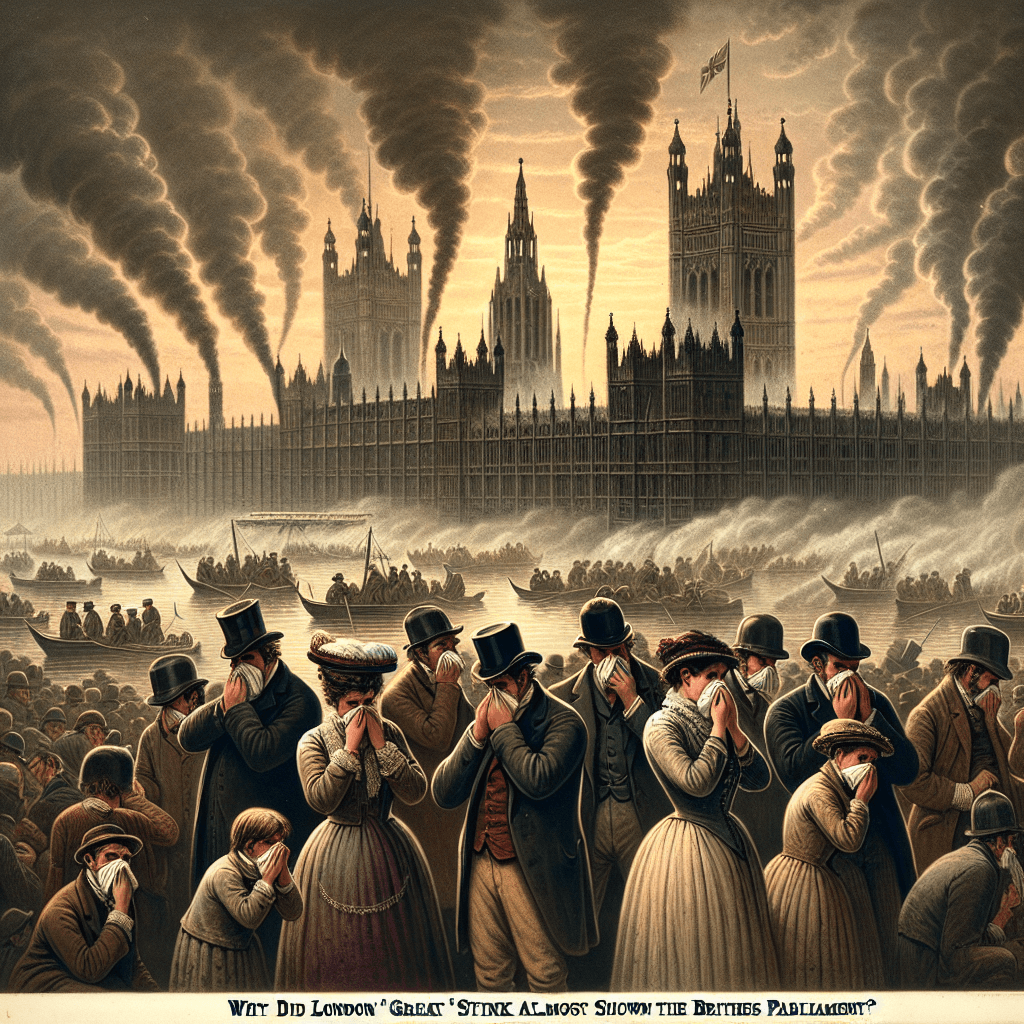From Foul Air to Urgent Action: Why London's 'Great Stink' Almost Shut Down Parliament
In the sweltering summer of 1858, a smell so overpowering gripped London that it threatened to bring the legislative heart of the British Empire to a standstill. This was the reality of the 'Great Stink,' an environmental crisis born from the polluted River Thames.


Too Long; Didn't Read
In 1858, the smell from London's polluted River Thames was so foul it nearly forced the British Parliament to close, prompting urgent action to fix the city's sanitation.
From Foul Air to Urgent Action: Why Did London's 'Great Stink' Once Almost Shut Down the British Parliament?
Imagine a smell so overpowering, so utterly foul, that it threatened to bring the legislative heart of a global empire to a standstill. This isn't a dramatic embellishment but a stark reality from Victorian London. In the scorching summer of 1858, the city was gripped by what became infamously known as the "Great Stink," an environmental crisis so acute it nearly forced the closure of the British Parliament. This post explores the crucial question: Why did London's 'Great Stink' once almost shut down the British Parliament, examining the perfect storm of factors that led to this olfactory assault and the monumental changes it spurred.
The River Thames: An Open Sewer in the Heart of an Empire
By the mid-19th century, London was the largest and most prosperous city in the world, but its rapid, unregulated growth came at a steep price.
- Population Boom: The Industrial Revolution had swelled London's population to over two million, overwhelming its archaic sanitation systems.
- Primitive Waste Disposal: Most homes relied on overflowing cesspools, and raw sewage, industrial effluent, and even waste from slaughterhouses were routinely dumped directly into the River Thames.
- The "Flush-and-Forget" Mentality: The popularization of the flushing toilet, ironically, exacerbated the problem by increasing the volume of waste flowing into the already overburdened river. The Thames, the city’s main source of drinking water for many, had effectively become a vast, open sewer.
- Miasma Theory: Prevailing medical belief held that diseases like cholera were spread by "miasma," or bad air. While incorrect about the direct cause (cholera is waterborne), the foul odours emanating from the polluted Thames certainly fueled public and official fear.
The Summer of 1858: The 'Great Stink' Arrives
The summer of 1858 was unusually hot and dry. This climatic condition was the final straw.
- Concentrated Filth: Low rainfall meant the Thames’s water levels dropped significantly, and its flow became sluggish. This caused the tons of untreated human and industrial waste to fester and decompose more intensely under the summer sun, rather than being washed out to sea.
- An Unbearable Odour: The stench became overwhelming, particularly along the riverbanks where key institutions, including the Houses of Parliament, were located. Contemporary accounts describe the smell as a noxious combination of sewage, decaying organic matter, and industrial chemicals, a "fermenting sewer" that was impossible to ignore.
Parliament Under Siege: The Power of Smell
The Houses of Parliament, newly rebuilt after a fire and situated directly on the north bank of the Thames, found themselves at the epicentre of the Great Stink.
- Legislative Disruption: The pervasive, choking smell infiltrated the committee rooms and chambers, making it nearly unbearable for Members of Parliament (MPs) and officials to conduct their duties. Reports from the time detail MPs feeling nauseous and unable to concentrate.
- Desperate Measures: Frantic attempts were made to mitigate the odour. Curtains were soaked in chloride of lime, a disinfectant, and hung over windows in an effort to purify the air. However, these measures proved largely ineffective against the sheer intensity of the stink.
- Debating Adjournment: The situation became so dire that serious discussions took place within Parliament about adjourning for the summer and relocating government business away from Westminster, possibly to Oxford or St Albans. The very functioning of the British government was under threat from the foul air. As The Illustrated London News reported, MPs were "fairly stunk out of their legislative palace."
The Catalyst for Reform: Bazalgette's Vision
The Great Stink, while a period of intense discomfort and civic embarrassment, acted as a powerful catalyst for long-overdue action. The direct threat to the functioning of Parliament galvanized politicians in a way that years of public health advocacy and cholera outbreaks had not.
- Urgent Legislation: Within a mere 18 days of the peak of the Stink, Parliament passed an enabling act to fund a new, comprehensive sewage system for London. The urgency was palpable.
- Sir Joseph Bazalgette's Masterpiece: The monumental task fell to the engineer Sir Joseph Bazalgette. His ingenious plan involved constructing a network of 82 miles of underground brick-lined main intercepting sewers running parallel to the Thames, designed to divert waste eastward, far beyond the main populated areas of London, to be discharged into the estuary at high tide.
- A Healthier Future: Bazalgette’s system, completed in 1875, was a triumph of Victorian engineering. It dramatically improved the cleanliness of the Thames, significantly reduced waterborne diseases like cholera and typhoid, and laid the foundation for modern sanitation in the city.
The Great Stink of 1858 serves as a potent reminder of the profound impact environmental conditions can have on society, even on its most powerful institutions. The fact that London's 'Great Stink' once almost shut down the British Parliament underscores how a crisis, born of neglect and outdated infrastructure, forced a reluctant government into taking decisive action. This pivotal moment in London's history not only cleared the air but also paved the way for significant public health advancements, demonstrating that sometimes, it takes an overwhelming stench to awaken the senses to the need for profound change.


